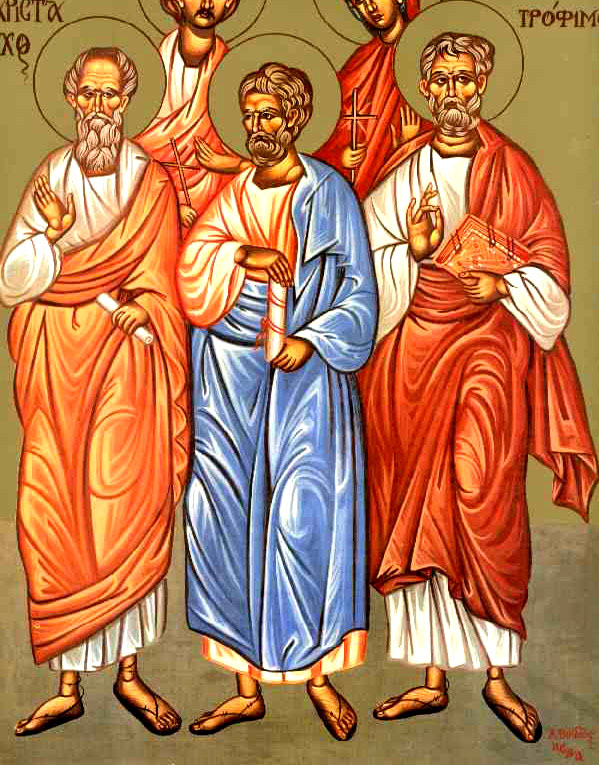

The holy apostles Aristarchus, Pudens, and Trophimus were members of the Seventy. Aristarchus was bishop of Apamea in Syria, and mentioned by Paul several times in his epistles (Acts 19:29l Col. 4:10; Philemon v.24). Paul calls him “my fellow-prisoner” and “my fellow-laborer.” Pudens was an important Roman citizen. Paul mentions him once (II Tim 4:21). Trophimus was an Asian (Acts 20:4) who accompanied Paul on his journeys. In one place, Paul laments, “Trophimus have I left at Miletum, sick.” (II Tim. 4:21) They died during the persecutions of the emperor Nero.
Troparion
O holy apostles, intercede with the all-merciful God that He may grant us forgiveness for our sins.
Kontakion
This precious feast is truly apostolic, for it enlightens us and dispels the fog of sin for those who sing: The Light has been shown to us. Deliverance is at hand.
Epistle
Acts 6: 8-15, 7: 1-5a and 47-60
Stephen was a man filled with grace and power, who worked great wonders and signs among the people. Certain members of the so-called “Synagogue of Roman Freedmen” (that is, the Jews from Cyrene, Alexandria, Cilicia, and Asia) would undertake to engage Stephen in debate, but they proved no match for the wisdom and spirit with which he spoke. They persuaded some men to make the charge that they had heard him speaking blasphemies against Moses and God, and in this way they incited the people, the elders, and the scribes. All together they confronted him, seized him, and led him off to the Sanhedrin. There they brought in false witnesses, who said: “This man never stops making statements against the holy place and the law. We have heard him claim that Jesus the Nazorean will destroy this place and change the customs which Moses handed down to us.” The members of the Sanhedrin who sat there stared at him intently. Throughout, Stephen’s face seemed like that of an angel.
The high priest asked whether the charges were true. To this Stephen replied: “My brothers! Fathers! Listen to me. The God of glory appeared to our father Abraham when he was still in Mesopotamia and before he styles in Haran. God said to him, Leave your country and your kinsfolk, and go to the land I will show you. So he left the land of the Chaldeans and settled in Haran. After Abraham’s father died, God made him move from there to this land where you now dwell. God did not give him any of it as his heritage, not even a foot of land.
“It was Solomon, however, who constructed (the temple). Yet the Most High does not dwell in buildings made by human hands, for as the prophet says: ‘The heavens are my throne, the earth is my footstool; what kind of house can you build me? asks the Lord. What is my resting-place to be like? Did not my hand make all these things?’
“You stiff-necked people, uncircumcised in heart and ears, you are always opposing the Holy Spirit just as your fathers did before you. Was there ever any prophet who your fathers did not persecute? In their day, they put to death those who foretold the coming of the Just One; now you in your turn have become his betrayers and murderers. You who received the law through the ministry of angels have not obeyed it.”
Those who listened to his words were stung to the heart; they ground their teeth in anger at him. Stephen meanwhile, filled with the Holy Spirit, looked to the sky above and saw the glory of God, and Jesus standing at God’s right hand. “Look!” he exclaimed, “I see an opening in the sky, and the Son of Man standing at God’s right hand.” The onlookers were shouting aloud, holding hands over their ears as they did so. Then they rushed at him as one man, dragged him out of the city, and began to stone him. The witnesses meanwhile were piling their cloaks at the feet of a young man named Saul. As Stephen was being stoned he could be heard praying, “Lord Jesus, receive my spirit.” He fell to his knees and cried out in a loud voice, “Lord, do not hold this sin against them.” And with that he died.
Gospel
John 4: 46-54
At that time in Capernaum there happened to be a royal official whose son was ill. When he heard that Jesus had come back from Judea to Galilee, he went to Jesus and begged him to come down and restore health to his son, who was near death. Jesus replied, “Unless you people see signs and wonders, you do not believe.” “Sir,” the royal official pleaded with Jesus, “come down before my child dies.” Jesus told him, “Return home. Your son will live.” The man out his trust in the word Jesus spoke to him, and started home.
He was on his way there when his servants met him with the news that his boy was going to live. When he asked them at what time the boy had shown improvement, they told him, “The fever left him yesterday afternoon about one.” It was at that very hour, the father realized, that Jesus had told him, “Your son is going to live.” He and his whole household thereupon became believers. This was the second sign that Jesus performed on returning from Judea to Galilee.
Icon courtesy of Jack Figel, Eastern Christian Publications – ecpubs.com
Sunday, April 14 –